Year 12 Common Module Study Guides
Learning methods available
Select a year to see available courses
In this article, Sherryn teaches you how to use self-reflection and planning to study effectively with a step-by-step guide and detailed images.

Join 75,893 students who already have a head start.
"*" indicates required fields
In this article, Matrix Alumnus and North Sydney Girls high graduate teaches you how to use self-reflection and planning to study effectively.
Sherryn Hu
North Sydney Girls High School
Double Degree Science/Dentistry at USYD
99.50+ (She achieved an ATAR of 99.50!)
Paediatric Dentist
I believe that dentistry is an incredibly important field of health that everyone should not only have access to but feel comfortable when receiving it. I also really enjoy working with younger children, and I hope to be able to inspire good habits and an appreciation for oral health early on in their lives!
I enjoyed these subjects and worked extremely hard on them.
In comparison to my other subjects, I did significantly more past papers and attempted many hard questions throughout the term. I also tended to prioritise my Maths homework over other tasks as it is a subject that requires consistent effort.
I didn’t do very well in my first creative task, and it significantly impacted my final marks for the course.
Despite knowing that it would most likely not contribute to my ATAR, I did not drop English Extension I as it helped me become a better English Advanced student, and I enjoyed the texts we studied.
The most important study strategies I used throughout Year 11 and 12 was self-reflection, revision and study planning!
Each week, I would set aside one entire day to review everything I had done over the past week, reflect on what I was doing well and what needed improvement, and make plans for the following week accordingly. This may seem like a waste of time, but I really cannot stress its importance to your overall productivity and the effectiveness of your studying. It ensures that you are taking note of all your common mistakes so that you will not make them again, and it will also force you to prioritise your weaknesses, this being my #1 problem during my senior years. Here are the steps I took to overcome this barrier to success and turn the results of my studies into realistic study plans!
Never leave any work you have done unmarked or unreviewed! I was definitely guilty of this in earlier years, as I would simply do a practice paper and check the answers.
Depending on how I did, I would either move on to the next paper feeling great if I had done well or quickly try to redeem myself if I had done poorly. This mentality is highly detrimental to your studying, as you are likely to continue to make the same mistakes or fail to establish good, fool-proof ways to approach certain questions.
Even if you don’t have time to properly review your work straight afterwards, make sure to dedicate time to do so, such as setting aside an entire day for reviewing as I did, because it is definitely worth your time.
After critically marking my work, I would write down some short notes/reminders based on any mistakes I made, no matter how small or silly they may have seemed. I liked to record them on sticky notes and organise them by topic and used shorthands that would help me remember them more easily.
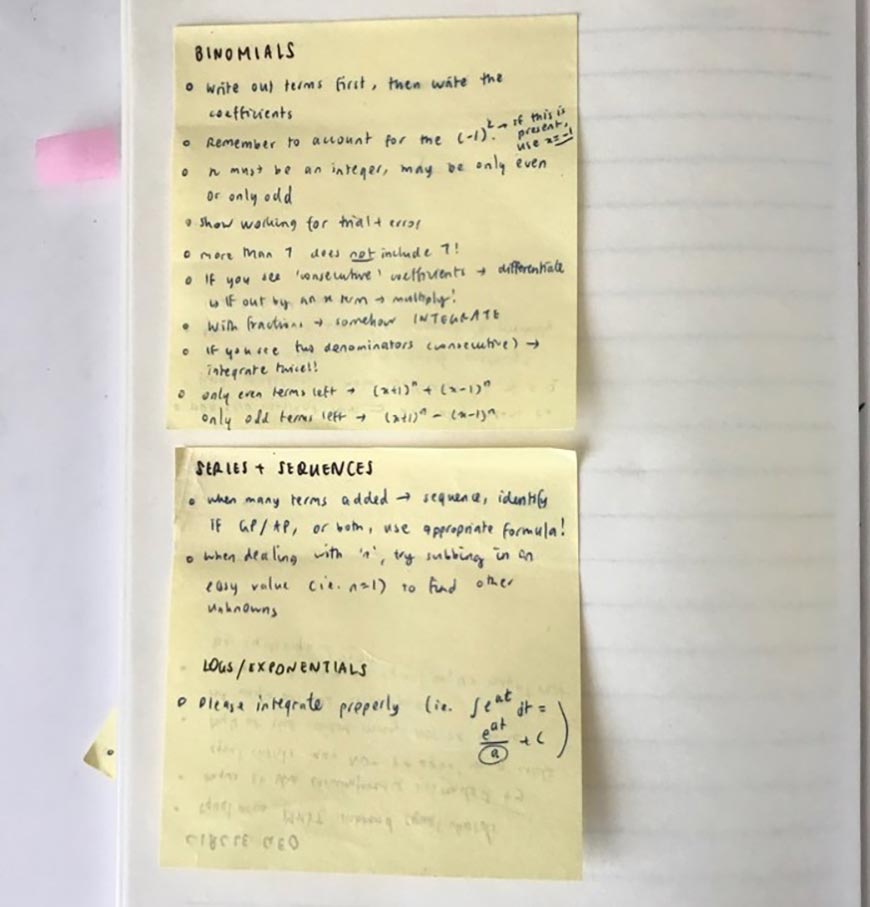
I would then read over these on the final days before an exam so that they are fresh in my mind, hence meaning that I would be less likely to make the same mistakes again and would also be on the lookout for common question ‘traps’.
I also liked to record any harder questions from past papers in a small notebook and attempt them again closer to the exam.
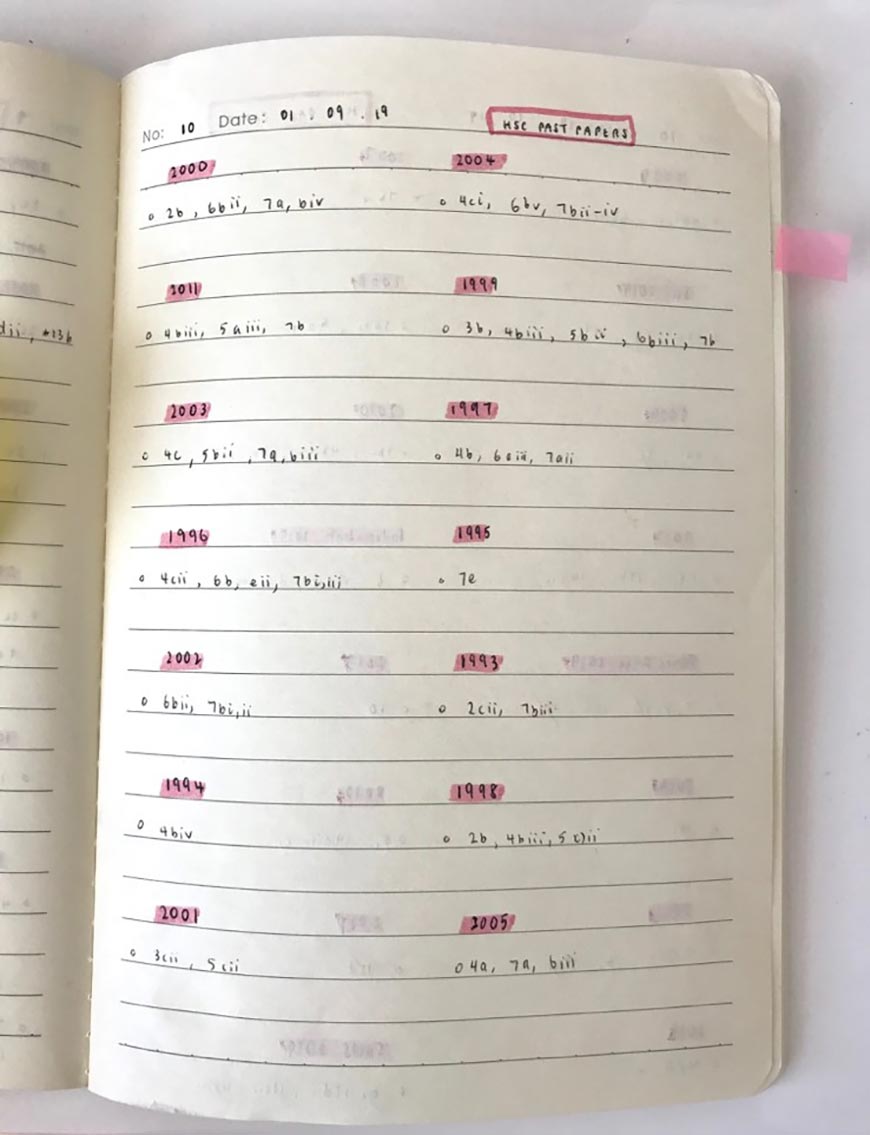
After marking and reviewing all the work I had done over the week for a particular subject, I would then begin the self-reflecting process.
This involved answering the following questions:
Here is an example of my reflection for Chemistry:
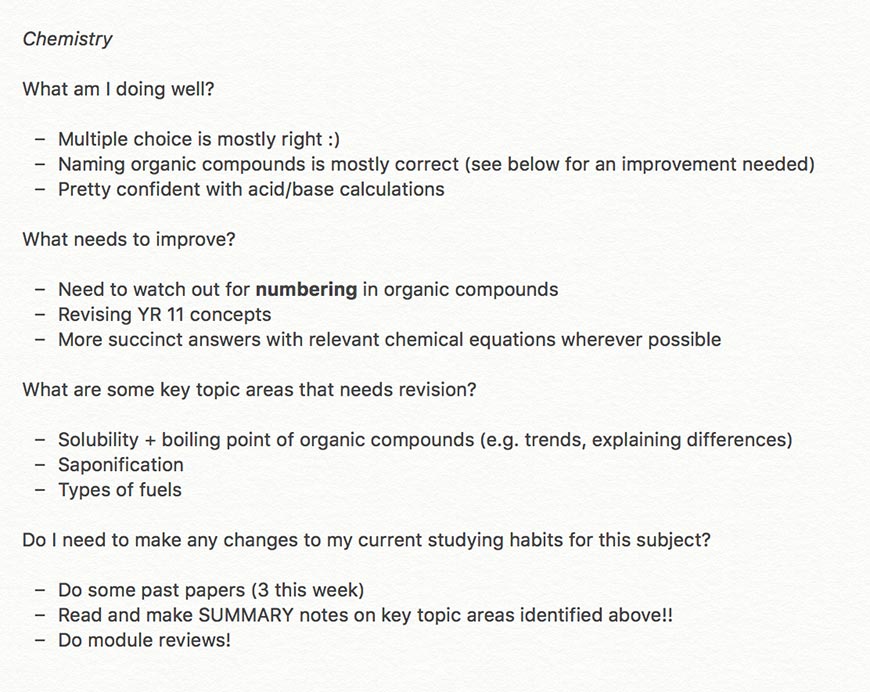
In answering these questions, I had to identify both positives and negatives, so being honest with myself was a must! It also required me to be highly specific about certain topic areas that urgently needed improvement, and it thus shaped the plans or goals I set for the following week.
I used a word document to make my daily study plans, organised by subject and in weekly blocks.
In this document, I would add in all the tasks I wanted to achieve over the week and on which day I hoped to achieve them by.
I used different colours as an indication of whether I was able to achieve my goals:
The ‘progress notes’ I included helped me keep track of what question I was up to and ensured that I would not leave anything unattempted.
One of the most important aspects of keeping a study plan is to be open to change and to be adaptable. When you are unable to complete a task by the time you initially planned, make sure to take note of that in your document, and shift certain tasks around to accommodate for this.
Don’t be afraid to make changes to your plans, as this is the best way to ensure that you are constantly reflecting on your studies and prioritising what will be most beneficial in the long run.
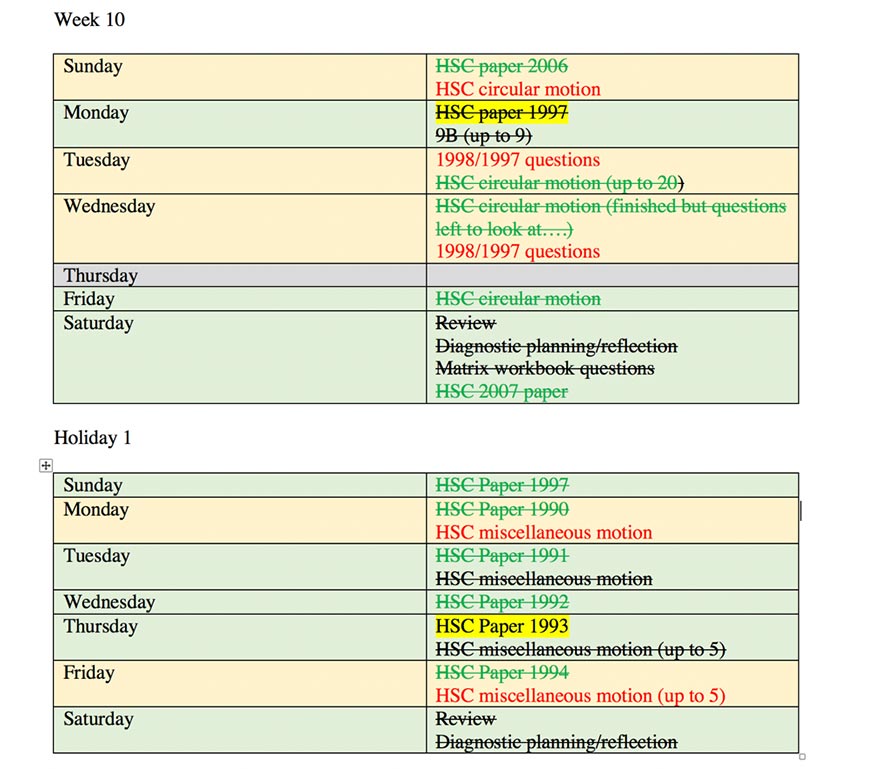
Simply coming up with a study plan is not sufficient – you have to follow through with them to the best of your abilities. As the word document was not always readily accessible, I employed the help of productivity apps to stay organised and motivated.
Throughout Year 12, I used the app Todoist, which significantly improved my ability to prioritise, manage my time and schedule different tasks. It has a very user-friendly interface, great colour coding features and ‘karma streaks’ to keep you motivated.
After updating my study plans document each week, I would then add each of the tasks to my Todoist lists and use their prioritisation and time reminder functions to stay organised! It can be synced across multiple devices and also provided me with a clearer image of exactly how many tasks I had to complete each day.
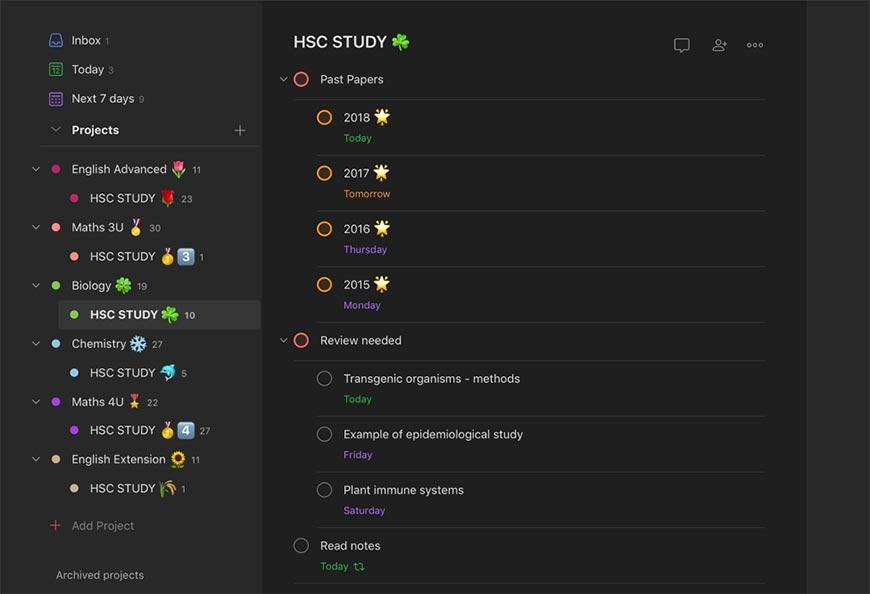
Studying shouldn’t stop because you’re at home! With Matrix+, we provide you with clear and structured online lesson videos, quality resources, and forums to ask your Matrix teachers questions and for feedback.
Learn more about our Matrix+ Online courses now.
Get ahead with Matrix+ Online
Expert teachers, detailed feedback and one-to-one help. Learn at your own pace, wherever you are.
English was a variable subject for me, as I would perform very well in certain tasks and do poorly in others.
Throughout Year 12, I tried to dedicate a significant proportion of my time to English and made sure to do at least one English-related task each day for consistent effort.
During the term, I would compile notes based on classwork, peer discussion, research and my interpretations of the texts. However, I found that simply having notes was not the most effective way of preparing for English exams, especially for Trials and the HSC.
Instead, I transformed my quotes and analysis into digital flashcards using the app, Cram. This meant that I could easily memorise them on my way to school or when I was waiting for public transport and so on, and through consistently reading over them and revising them.
I was eventually able to ‘recite’ them without prompts and had a large bank of analysis that I could easily draw upon inside my head. I highly recommend doing these flashcards earlier rather than later as you don’t want to be making notes or flashcards in the lead up to an exam.
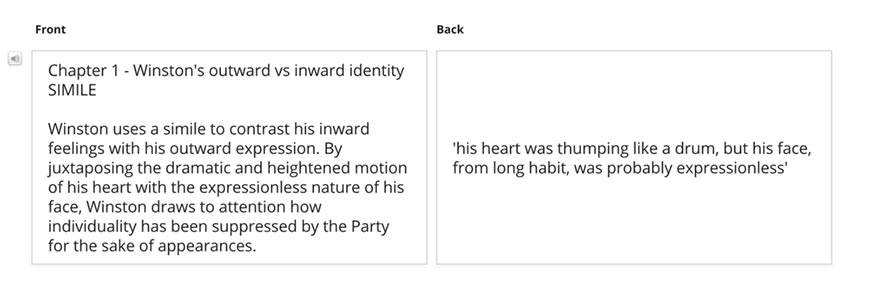
Don’t type up your essay responses!
Rather, you should be aiming to handwrite as many practice responses as possible!
If you don’t have time to write a full practise essay every day, make sure to find the time to do a simple essay plan in response to an unseen question.
This will help you decide what quotes are relevant to certain question types. Finally, although the short answer questions are only 20% of the exam, their importance should not be underestimated. Find as many short stories, poems and images as you can and analyse them! This will greatly improve your ability to analyse a text quickly but effectively, and will also contribute to your appreciation of the Craft of Writing for Module C.
When reflecting upon your progress and studies for English, consider how easily you were able to respond to the essay questions you came across:
If not, revisit your text and deepen your understanding of these aspects – this should then be on the top of your priority list and study plans.
I attended the English Advanced HSC preparatory course in the holidays. The English HSC prep course was highly intensive and the feedback I received was invaluable. During those 6 days, I was able to revise each module in great detail and gained new insights through discussion and collaboration with other students from different schools.
There is no denying that the best way to improve in maths is to practice, practice and practice some more! Regardless of how tedious maths homework may seem, you must do all the homework you are set, even if you have to complete it past the due date.
However, mindless practice is just as useless as no practice, so make sure you mark any work you do and never leave a question unanswered. If you don’t understand how you got to an answer, seek help, check solutions or flag it for review in the future.
For exam preparation, start by doing some questions by topic before doing past papers to ensure that you know all the content first.
This should inform the direction of your studies, as you should review the topics you identify in a greater amount of detail in the following week. At the end of the day, almost all math questions are derived from a set of known topic areas – it is up to you to familiarise yourself with them so that you can determine what is being tested at any moment, no matter how obscure they may seem.
I attended Matrix for Mathematics Extension 2 during the term. I liked the detailed notes in the math lesson books and how there was a vast range of questions of varying difficulty in the workbooks. The in-class quizzes greatly benefitted me as it stimulated an exam environment, which was something that I continually struggled with, and the various mock exams we received throughout the year also benefitted me in this regard too.
For science subjects, I highly recommend hand-writing your notes during the term or whilst you learn the topics during class.
Within your notes, include:
I found study groups very effective for science subjects, as it was a great way to seek or give feedback on written responses and deepen understanding of certain syllabus dot points.
I was the study group leader for both a Chemistry and Biology study group and was responsible for organising content to be reviewed, setting homework tasks, finding practice questions and making quizzes.
In the lead up to the Trial and HSC exams, in particular, I compiled many past HSC questions which were relevant to the new syllabus and encouraged group members to post their responses to receive feedback. As the provider of this feedback, I was able to gain a deeper insight into various ways to approach a question and different types of examples that could be used.
The collaborative aspects of study groups meant that it was more enjoyable and beneficial for all involved, so definitely try to organise or join one!
Often, I would set myself high (and unrealistic) goals, which only made me feel worse when I couldn’t achieve them. This was a negative aspect of my study habits as it made me feel demotivated and also deluded me to the hard work I had done.
If I could restart my HSC year, I would perfect my ability to prioritise and study smart earlier in the year, using the routine I have outlined above!
Although my teachers were highly skilled and approachable, I found it very difficult to seek help or gain extra feedback. My insecurities about the quality of my work meant that the vast majority of my studies were done independently.
In hindsight, I definitely should have reached out to more people, as I would have been likely to see more drastic improvements.
Written by Guest Author
We have regular contributions to our blog from our Tutor Team and high performing Matrix Students. Come back regularly for these guest posts to learn their study hacks and insights!© Matrix Education and www.matrix.edu.au, 2023. Unauthorised use and/or duplication of this material without express and written permission from this site’s author and/or owner is strictly prohibited. Excerpts and links may be used, provided that full and clear credit is given to Matrix Education and www.matrix.edu.au with appropriate and specific direction to the original content.